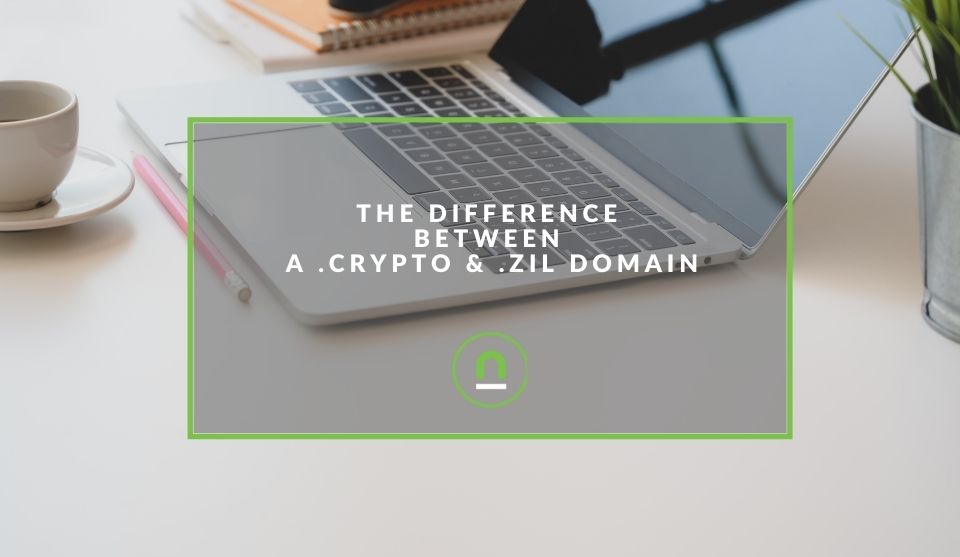Recent posts

Money Talks
XRP vs. Stablecoins: Which Is Better for Cross-Border Payments in 2026?
28 January 2026

Press Releases
Sleep Expert Cautioning Against TikTok’s ‘Mouth Taping’ Trend
28 January 2026

Press Releases
Why Vintage Watches Are the Hottest Trend in 2026
27 January 2026

Press Releases
Africaworks Accelerates The Rollout Of Real Estate Investment Platform
20 January 2026
Popular posts
Extravaganza
Trending Music Hashtags To Get Your Posts Noticed
24 August 2018
Geek Chic
How To Fix iPhone/iPad Only Charging In Certain Positions
05 July 2020
Extravaganza
Trending Wedding Hashtags To Get Your Posts Noticed
18 September 2018
Money Talks
How To Find Coupons & Vouchers Online In South Africa
28 March 2019
The Difference Between A .Crypto & .Zil Domain
23 March 2022 | 0 comments | Posted by Claire Wouters in Geek Chic
So you've heard about these new decentralised domains with their new TLD structure like .crypto and .eth or .zil. You were probably wondering what they mean and what the possible differences are apart from pricing. You're in luck because we'll break down each difference between a .crypto and .eth domain versus the ones ending in .zil.
Traditional domains that are ICANN registered used to have a strict geographical domain name structure. You could have .com which was global but often attributed to the US, and localised domains, such as co.uk for the UK or .de for Germany.
As you can imagine, as the internet grew, new TLD extensions needed to register as the number of domain names had to grow. Either website was in use with your business name, or a squatter would be waiting for you to bid for it. Eventually, new TLD extensions were recognised, and that's why you now find websites with all sorts of endings such as .africa or .tech.
This has given people more options to register a personal or business domain but also makes it confusing as to why decentralised domains are a little different.
The difference between crypto/eth and ZiL?
In the case of domains like .crypto and .eth, they are tokenised and minted using the ERC-721 protocol on Ethereum and would be native to the Ethereum blockchain. There are methods of moving an NFT native to Ethereum to other blockchains, but this is a story for another day.
As for .zil domains, they are an NFT minted using ZRC-6 token standard on the Zilliqa blockchain.
Since these domains are referenced from different chains, they do not have native interoperability with one another to swap as you please or trade on certain platforms. Having your domain on Ethereum allows you to transfer it to other Ethereum addresses if needed, as well as to list your domains for retail on Ethereum based NFT marketplaces.
As with .zil domains, you would need a Zil compatible wallet that also recognises Zil NFTs. You would be restricted to moving your domain to another Zilliqa address and reselling it on Zilliqa based or supporting NFT marketplaces.
Why would you choose between the .crypto/.eth or .zil domains?
Since you're working in completely different environments when it comes to transferring domains and reselling them, however, building on the domain via a service like Unstoppable domains remains the same.
So why would you pick one over the other? It all depends on your intention for the domain. If you're going to be buying domains to resell, then .crypto and .eth domains may be attractive to you because you're able to sell them to a wider audience and ecosystem that has a lot more liquidity.
The issue with this is that ETH gas fees can really eat into your margins and may not make having every domain name worthwhile, so you have to pick domains you think people would want to own in the future.
If you opt for a .zil domain, you're going to be able to buy and transfer domains much faster and cheaper, but you will have less of an audience to market and resell to compared to the likes of Ethereum.
The censorship and security premium
The reason for the discrepancy in price and speed of the different networks is down to the fact that Ethereum uses proof of work to achieve consensus, whereas Zilliqa uses proof of stake. Proof of work may be slower and more expensive, but it provides far better network security and censorship resistance when compared to proof of stake. So naturally, that premium will translate into the value of items hosted on that blockchain.
If a blockchain has more security, people have more confidence in it and are willing to pay a higher price for assets on that chain.
Exploring the decentralised web
If you have purchased a decentralised domain or you want to explore domains that others have created websites for, then you can either use directories created to curate these websites or decentralised search engines. These websites will give you access not only to others websites, but any of the websites you've built on either of the domains you own, regardless of the blockchain it's on because they support both the Ethereum and Zilliqa blockchains.
Reserving your domain
Now that you know how decentralised domain registration works, will you be getting one? Do you own one already? If not you can purchase one today at Unstoppable Domains.
If you have any questions, Let us know in the comment section down below.
Contact us
If you're having trouble getting started with purchasing the right domain then feel free to contact us and let's see how we can help you get a domain to get started.
Are you looking to promote your business?
South African Business owners can create your free business listing on nichemarket. The more information you provide about your business, the easier it will be for your customers to find you online. Registering with nichemarket is easy; all you will need to do is head over to our sign up form and follow the instructions.
If you require a more detailed guide on how to create your profile or your listing, then we highly recommend you check out the following articles.
Recommended reading
If you enjoyed this post and have a little extra time to dive deeper down the rabbit hole, why not check out the following posts about website domains.
- 9 Steps To Take Before Picking Your Domain Name
- Moz Launches Domain Authority Version 2.0 To Bring SEO Metrics Into 2019
- How To Set Up An Email Address With Your Ethereum Wallet
Tags: Blockchain, NFT, Domains
You might also like
Africaworks Accelerates The Rollout Of Real Estate Investment Platform
20 January 2026
Posted by Nicolas Teisserenc in Press Releases
AWIP accelerates the rollout of its urban real estate investment platform in West Africa, raising €4m and fully deploying it into two off-market acqu...
Read moreSleep Expert Cautioning Against TikTok’s ‘Mouth Taping’ Trend
28 January 2026
Posted by Steph M in Press Releases
Sleep expert warns that the viral mouth taping trend flooding TikTok could pose serious risks for people with undiagnosed sleep apnea and other sleep...
Read more{{comment.sUserName}}
{{comment.iDayLastEdit}} day ago
{{comment.iDayLastEdit}} days ago
 {{blogcategory.sCategoryName}}
{{blogcategory.sCategoryName}}
